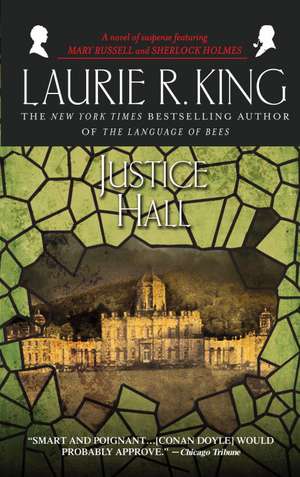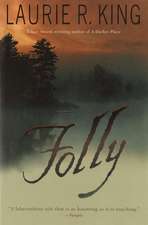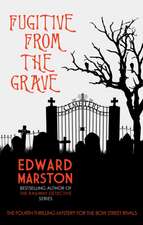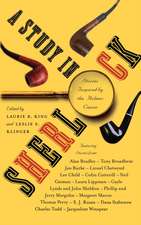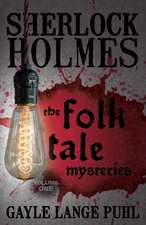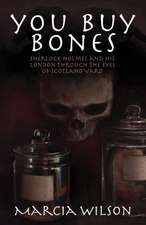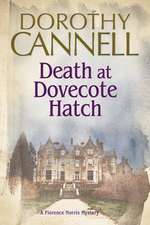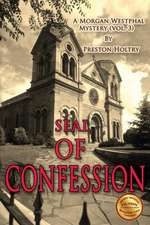Justice Hall: Mary Russell Novels (Paperback)
Autor Laurie R. Kingen Limba Engleză Paperback – 31 mar 2009 – vârsta de la 14 până la 18 ani
A trail of ominous clues comprise a mystery that leads from an English hamlet to the city of Paris to the wild prairie of the New World. The trap is set, the game is afoot; but can Holmes and Russell catch an elusive killer--or has the murderer caught them?
BONUS: This edition contains an excerpt from Laurie R. King's Pirate King.
| Toate formatele și edițiile | Preț | Express |
|---|---|---|
| Paperback (2) | 50.05 lei 3-5 săpt. | +20.86 lei 6-10 zile |
| ALLISON & BUSBY – mai 2014 | 50.05 lei 3-5 săpt. | +20.86 lei 6-10 zile |
| Bantam Books – 31 mar 2009 | 114.64 lei 3-5 săpt. | +61.80 lei 6-10 zile |
Preț: 114.64 lei
Nou
Puncte Express: 172
Preț estimativ în valută:
21.94€ • 23.82$ • 18.43£
21.94€ • 23.82$ • 18.43£
Carte disponibilă
Livrare economică 02-16 aprilie
Livrare express 18-22 martie pentru 71.79 lei
Preluare comenzi: 021 569.72.76
Specificații
ISBN-13: 9780553381719
ISBN-10: 0553381717
Pagini: 331
Dimensiuni: 130 x 206 x 20 mm
Greutate: 0.41 kg
Editura: Bantam Books
Seria Mary Russell Novels (Paperback)
ISBN-10: 0553381717
Pagini: 331
Dimensiuni: 130 x 206 x 20 mm
Greutate: 0.41 kg
Editura: Bantam Books
Seria Mary Russell Novels (Paperback)
Notă biografică
Laurie R. King became the first novelist since Patricia Cornwell to win prizes for Best First Crime Novel on both sides of the Atlantic with the publication of her debut thriller, A Grave Talent. She is the bestselling author of four contemporary novels featuring Kate Martinelli, the award-winning Mary Russell series, and the bestselling novels A Darker Place, Folly, and Keeping Watch. She lives in northern California. Bantam will publish her next Russell and Holmes mystery in 2010.
Extras
Chapter One
Home, my soul sighed. I stood on the worn flagstones and breathed in the many and varied fragrances of the old flint-walled cottage: Fresh beeswax and lavender told me that Mrs. Hudson had indulged in an orgy of housecleaning in the freedom of our prolonged absence; the smoke from the wood fire seemed cleaner than the heavy peat-tinged air I'd been inhaling in recent weeks; the month-old pipe tobacco was a ghost of its usual self; and beneath it all the faint, dangerous, seductive tang of chemicals from the laboratory overhead.
And scones.
Holmes grumbled his way past, jostling me from my reverie. I stepped back out into the crisp, sea-scented afternoon to thank my farm manager, Patrick, for meeting us at the station, but he was already away down the drive, so I closed the heavy door, slid its two-hundred-year-old bolt, and leant my back against the wood with all the mingled relief and determination of a feudal lord shutting out an unruly mob.
Domus, my mind offered. Familia, my heart replied. Home.
"Mrs. Hudson!" Holmes shouted from the main room. "We're home." His unnecessary declaration (she knew we were coming; else why the fresh baking?) was accompanied by the characteristic thumps and cracks of possessions being shed onto any convenient surface, freshly polished or not. At the sound of her voice answering from the kitchen, I had to smile. How many times had I returned here, to that ritual exchange? Dozens: following an absence of two days in London when the only things shed were furled umbrella and silk hat, or after three months in Europe when two burly men had helped to haul inside our equipage, consisting of a trunk filled with mud-caked climbing equipment, three crates of costumes, many arcane and ancient volumes of worldly wisdom, and two-thirds of a motor-cycle.
The only time I had come to this house with less than joy was the day when Holmes and my nineteen-year-old self had been acting out a play of alienation, and I could see in his haggard features the toll it was taking on him. Other than that time, to enter the house was to feel the touch of comforting hands. Home.
I caught up my discarded rucksack and followed Holmes through to the fire; to tea, and buttered scones, and welcome.
Hot tea and scalding baths, conversations with Mrs. Hudson, and the accumulated post carried us to dinner: urgent enquiries from my solicitor regarding a property sale in California; a cheerful letter from Holmes' old comrade-at-arms, Dr Watson, currently on holiday in Egypt; a demand from Scotland Yard for pieces of evidence in regard to a case over the summer. Over the dinner table, however, the momentum of normality came to its peak over Mrs. Hudson's fiery curry, faltered with the apple tart, and then receded, leaving us washed up in our chairs before the fire, listening to the silence.
I sighed to myself. Each time, I managed to forget this phase—or not forget, exactly, just to hope the interim would be longer, the transition less of a jolt. Instead, the drear aftermath of a case came down with all the gentleness of a collapsing wall.
One would think that, following several taut, urgent weeks of considerable physical discomfort on Dartmoor, a person would sink into the undemanding Downland quiet with a bone-deep pleasure, wrapping indolence around her like a fur coat, welcoming a period of blank inertia, the gears of the mind allowed to move slowly, if at all. One would think.
Instead of which, every time we had come away from a case there had followed a period of bleak, hungry restlessness, characterised by shortness of temper, an inability to settle to a task, and the need for distraction—for which long, difficult walks or hard physical labour, experience taught me, were the only relief. And now, following not one but two, back-to-back cases, with the client of the summer's case long dead and that of the autumn now taken to his Dartmoor deathbed, this looked to be a grim time indeed. To this point, the worst such dark mood that I had experienced was that same joyless period just under five years before, when I was nineteen and we had returned from two months of glorious, exhilarating freedom wandering Palestine under the unwilling tutelage of a pair of infuriating Arabs, Ali and Mahmoud Hazr, only to return to an English winter, a foe after our skins, and a necessary pretence of emotional divorcement from Holmes. I am no potential suicide, but I will say that acting one at the time would not have proved difficult.
Hard work, as I say, helped; intense experiences helped, too: scalding baths, swims through an icy sea, spicy food (such as the curry Mrs. Hudson had given us: How well she knew Holmes!), bright colours. My skin still tingled from the hot water, and I had donned a robe of brilliant crimson, but the coffee in my cup was suddenly insipid. I jumped up and went into the kitchen, coming back ten minutes later with two cups of steaming hot sludge that had caused Mrs. Hudson to look askance, although she had said nothing. I put one cup beside Holmes' brandy glass and settled down on a cushion in front of the fire with the other, wrapping both hands around it and breathing in the powerful fragrance.
"What do you call this?" Holmes asked sharply.
"A weak imitation of Arab coffee," I told him. "Although I think Mahmoud used cardamom, and the closest Mrs. Hudson had was cinnamon."
He raised a thoughtful eyebrow at me, peered dubiously into the murky depths of the cup, and sipped tentatively. It was not the real thing, but it was strong and vivid on the palate, and for a moment the good English oak beams over our heads were replaced by the ghost of a goat's hair tent, and the murmur of the flames seemed to hold the ebb and flow of a foreign tongue. New flavours, new dangers, and the sun of an ancient land, the land of my people; trials and a time of great personal discovery; our Bedu companions, Mahmoud the rock and Ali the flame. Odd, I thought, how the taciturn older brother had possessed such a subtle hand at the cook-fire, and had made such an art of the coffee ritual.
No, the dark substance in our cups was by no means the real thing, but both of us drank to the dregs, while images from the weeks in Palestine flickered through the edges of my mind: dawn over the Holy City and mid-night in its labyrinthine bazaar; the ancient stones of the Western Wall and the great cavern quarry undermining the city's northern quarter; Ali polishing the dust from his scarlet Egyptian boots; Mahmoud's odd, slow smile of approval; Holmes' bloody back when we rescued him from his tormentor; General Allenby and the well-suited Bentwiches and the fair head of T. E. Lawrence, and—and then Holmes rattled his newspaper and the images vanished. I fluffed my fingers through my drying hair and picked up my book. Silence reigned, but for the crackle of logs and the turn of pages. After a few minutes, I chuckled involuntarily. Holmes looked up, startled.
"What on earth are you reading?" he demanded.
"It's not the book, Holmes, it's the situation. All you need is an aged retriever lying across your slippers, we'd be a portrait of family life. The artist could call it After a Long Day; he'd sell hundreds of copies."
"We've had a fair number of long days," he noted, although without complaint. "And I was just reflecting how very pleasant it was, to be without demands. For a short time," he added, as aware as I that the respite would be brief between easy fatigue and the onset of bleak boredom. I smiled at him.
"It is nice, Holmes, I agree."
"I find myself particularly enjoying the delusory and fleeting impression that my wife spends any time at all seated at the feet of her husband. One might almost be led to think of the word 'subservient,' " he added, "seeing your position at the moment."
"Don't push it, Holmes," I growled. "In a few more minutes my hair will be—"
My words and the moment were chopped short by the crash of a fist against the front door. The entire house seemed to shudder convulsively in reaction, and then Holmes sighed, called to Mrs. Hudson that he would answer it, and leant over to deposit his newspaper on the table. However, I was already on my feet; it is one thing to relax in the presence of one's husband and his long-time housekeeper, but quite another to have one's neighbour or farm manager walk in and find one in dishabille upon the floor.
"I'll see who it is, Holmes," I said. He rose, maintaining the pipe in his hand as a clear message to our intruder that he had no intention of interrupting his evening's rest, and tightening the belt of his smoking jacket with a gesture of securing defences, but he stayed where he was while I went to repel boarders at our door.
The intruder was neither a neighbour nor a lost and benighted Downs rambler, nor even Patrick come for assistance with an escaped cow or a chimney fire. It was a stranger dressed for Town, a thick-set, clean-shaven, unevenly swarthy figure in an ill-fitting and out-of-date city suit that exuded the odour of mothballs, wearing a stiff collar such as even Holmes no longer used and a brilliant emerald green necktie that had been sampled by moth. The hat on his head was an equally ancient bowler, and his right hand was in the process of extending itself to me—not to shake, but openhanded, as a plea. A thin scar travelled up the side of the man's brown wrist to disappear under the frayed cuff of the shirt, a thin scar that caught at my gaze in a curious fashion.
"You must help me," the stranger said. For some peculiar reason, my ears added a slight lisp to his pronunciation, which was not actually there.
"I beg your pardon, sir," I began to say, and then my eyes went back to the darkness on his temple that in the shadowy doorway I had taken for hair oil. "You are hurt!" I exclaimed, then turned to shout over my shoulder, "Holmes!"
"You must come with me," the man demanded, his command as urgent as his fist on the wood had been. Then to my confusion he added a name I had not heard in nearly five years. "Amir," he murmured, and his shoulder drifted sideways, to prop itself against the door frame.
I stared at him, moving to one side so the interior light might fall more brightly on his features. I knew that face: Beardless as it was, its missing front teeth restored, the hair at its sides conventionally trimmed, and framed by an incongruous suit and an impossible hat, it was nonetheless the face of a man with whom I had travelled in close proximity and uneasy intimacy for a number of weeks. I had worked with him, shed blood with him. I was, in fact, responsible for that narrow scar on his wrist.
"Ali?" I said in disbelief. "Ali Hazr?" His mouth came open as if to speak, but instead he stumbled, as if the door frame had abruptly given way; his right hand fluttered up towards his belt, but before his fingers could reach his waistcoat, his eyes rolled back in his head, his knees turned to water, and fourteen and a half stone of utterly limp intruder collapsed forward into my arms.
Chapter Two
The man lying between the crisp white sheets of the guest bed was very like Ali Hazr, but also distinctly unlike the Arab ruffian Holmes and I had known. In fact, I had nearly convinced myself that our visitor was merely a stranger with a strong resemblance to the man—a brother, perhaps—when a jab from the doctor's sewing needle brought him near to consciousness, and he growled a string of florid Arabic curses.
It was Ali, all right.
Before Holmes' pet medical man had clipped the thread from his half-dozen stitches, the patient had lapsed back into the restless swoon that had gripped him from the moment he fell through our door. Seeing his tossing head and hearing the apparent gibberish from his lips, the doctor reached back into his satchel for an hypodermic needle. With that, Ali finally succumbed to oblivion.
I adjusted the pad of clean towelling underneath his bandaged scalp and followed the two men out of the room, leaving the door ajar.
Downstairs in the kitchen, Dr Amberley was scrubbing the blood from his hands and giving Holmes a set of unnecessary instructions.
"I'd say his concussion is a mild one, but you'd best keep an eye on him, and if his pupils become uneven, or if he seems over-lethargic, telephone to me immediately. The dose of morphia I gave him was small, because of the concussion—it ought to wear off in three or four hours, although he may well sleep longer than that. I suppose you wish me to say nothing about this visitor of yours?"
"I think not. At this point I have no idea why he's here or what happened to him, and I'd not want to invite an attacker to join us. Although by the appearance of his overcoat, I should say this happened far from here."
It was true. Ali's incongruous city suit had been stiff with dried blood, his shirt collar saturated to the shoulders. Whatever had brought him here, desperation might well follow on his heels.
When the doctor had gone and Mrs. Hudson was tut-tutting over the ruined clothing, Holmes picked up his hastily abandoned pipe, knocked it out, and began to tamp fresh tobacco into the bowl. I went through the house to secure the doors and windows and draw the curtains, just in case.
"It has to be something to do with Mahmoud," I said when I came back. "Ali would not have come to England without him, and would not have come to us for help except if Mahmoud were in grave danger."
"It is difficult to imagine the one Hazr without the other," Holmes agreed. He got the pipe going, then resumed his three-week-old newspaper.
"But, shouldn't we do something? He may sleep for hours."
"What do you propose?"
"We could telephone to Mycroft."
He did lower the paper a fraction to consider the proposition, then shook his head.
"My brother is in London, unless he's left since this morning. If Ali wanted Mycroft, he'd have stopped there. He wanted us, which meant that either he thought we would not respond to a mere telegraph or telephone message, or secrecy was foremost. No, Ali came from Berkshire to see us, not to speak with Mycroft. We shall have to be patient."
Home, my soul sighed. I stood on the worn flagstones and breathed in the many and varied fragrances of the old flint-walled cottage: Fresh beeswax and lavender told me that Mrs. Hudson had indulged in an orgy of housecleaning in the freedom of our prolonged absence; the smoke from the wood fire seemed cleaner than the heavy peat-tinged air I'd been inhaling in recent weeks; the month-old pipe tobacco was a ghost of its usual self; and beneath it all the faint, dangerous, seductive tang of chemicals from the laboratory overhead.
And scones.
Holmes grumbled his way past, jostling me from my reverie. I stepped back out into the crisp, sea-scented afternoon to thank my farm manager, Patrick, for meeting us at the station, but he was already away down the drive, so I closed the heavy door, slid its two-hundred-year-old bolt, and leant my back against the wood with all the mingled relief and determination of a feudal lord shutting out an unruly mob.
Domus, my mind offered. Familia, my heart replied. Home.
"Mrs. Hudson!" Holmes shouted from the main room. "We're home." His unnecessary declaration (she knew we were coming; else why the fresh baking?) was accompanied by the characteristic thumps and cracks of possessions being shed onto any convenient surface, freshly polished or not. At the sound of her voice answering from the kitchen, I had to smile. How many times had I returned here, to that ritual exchange? Dozens: following an absence of two days in London when the only things shed were furled umbrella and silk hat, or after three months in Europe when two burly men had helped to haul inside our equipage, consisting of a trunk filled with mud-caked climbing equipment, three crates of costumes, many arcane and ancient volumes of worldly wisdom, and two-thirds of a motor-cycle.
The only time I had come to this house with less than joy was the day when Holmes and my nineteen-year-old self had been acting out a play of alienation, and I could see in his haggard features the toll it was taking on him. Other than that time, to enter the house was to feel the touch of comforting hands. Home.
I caught up my discarded rucksack and followed Holmes through to the fire; to tea, and buttered scones, and welcome.
Hot tea and scalding baths, conversations with Mrs. Hudson, and the accumulated post carried us to dinner: urgent enquiries from my solicitor regarding a property sale in California; a cheerful letter from Holmes' old comrade-at-arms, Dr Watson, currently on holiday in Egypt; a demand from Scotland Yard for pieces of evidence in regard to a case over the summer. Over the dinner table, however, the momentum of normality came to its peak over Mrs. Hudson's fiery curry, faltered with the apple tart, and then receded, leaving us washed up in our chairs before the fire, listening to the silence.
I sighed to myself. Each time, I managed to forget this phase—or not forget, exactly, just to hope the interim would be longer, the transition less of a jolt. Instead, the drear aftermath of a case came down with all the gentleness of a collapsing wall.
One would think that, following several taut, urgent weeks of considerable physical discomfort on Dartmoor, a person would sink into the undemanding Downland quiet with a bone-deep pleasure, wrapping indolence around her like a fur coat, welcoming a period of blank inertia, the gears of the mind allowed to move slowly, if at all. One would think.
Instead of which, every time we had come away from a case there had followed a period of bleak, hungry restlessness, characterised by shortness of temper, an inability to settle to a task, and the need for distraction—for which long, difficult walks or hard physical labour, experience taught me, were the only relief. And now, following not one but two, back-to-back cases, with the client of the summer's case long dead and that of the autumn now taken to his Dartmoor deathbed, this looked to be a grim time indeed. To this point, the worst such dark mood that I had experienced was that same joyless period just under five years before, when I was nineteen and we had returned from two months of glorious, exhilarating freedom wandering Palestine under the unwilling tutelage of a pair of infuriating Arabs, Ali and Mahmoud Hazr, only to return to an English winter, a foe after our skins, and a necessary pretence of emotional divorcement from Holmes. I am no potential suicide, but I will say that acting one at the time would not have proved difficult.
Hard work, as I say, helped; intense experiences helped, too: scalding baths, swims through an icy sea, spicy food (such as the curry Mrs. Hudson had given us: How well she knew Holmes!), bright colours. My skin still tingled from the hot water, and I had donned a robe of brilliant crimson, but the coffee in my cup was suddenly insipid. I jumped up and went into the kitchen, coming back ten minutes later with two cups of steaming hot sludge that had caused Mrs. Hudson to look askance, although she had said nothing. I put one cup beside Holmes' brandy glass and settled down on a cushion in front of the fire with the other, wrapping both hands around it and breathing in the powerful fragrance.
"What do you call this?" Holmes asked sharply.
"A weak imitation of Arab coffee," I told him. "Although I think Mahmoud used cardamom, and the closest Mrs. Hudson had was cinnamon."
He raised a thoughtful eyebrow at me, peered dubiously into the murky depths of the cup, and sipped tentatively. It was not the real thing, but it was strong and vivid on the palate, and for a moment the good English oak beams over our heads were replaced by the ghost of a goat's hair tent, and the murmur of the flames seemed to hold the ebb and flow of a foreign tongue. New flavours, new dangers, and the sun of an ancient land, the land of my people; trials and a time of great personal discovery; our Bedu companions, Mahmoud the rock and Ali the flame. Odd, I thought, how the taciturn older brother had possessed such a subtle hand at the cook-fire, and had made such an art of the coffee ritual.
No, the dark substance in our cups was by no means the real thing, but both of us drank to the dregs, while images from the weeks in Palestine flickered through the edges of my mind: dawn over the Holy City and mid-night in its labyrinthine bazaar; the ancient stones of the Western Wall and the great cavern quarry undermining the city's northern quarter; Ali polishing the dust from his scarlet Egyptian boots; Mahmoud's odd, slow smile of approval; Holmes' bloody back when we rescued him from his tormentor; General Allenby and the well-suited Bentwiches and the fair head of T. E. Lawrence, and—and then Holmes rattled his newspaper and the images vanished. I fluffed my fingers through my drying hair and picked up my book. Silence reigned, but for the crackle of logs and the turn of pages. After a few minutes, I chuckled involuntarily. Holmes looked up, startled.
"What on earth are you reading?" he demanded.
"It's not the book, Holmes, it's the situation. All you need is an aged retriever lying across your slippers, we'd be a portrait of family life. The artist could call it After a Long Day; he'd sell hundreds of copies."
"We've had a fair number of long days," he noted, although without complaint. "And I was just reflecting how very pleasant it was, to be without demands. For a short time," he added, as aware as I that the respite would be brief between easy fatigue and the onset of bleak boredom. I smiled at him.
"It is nice, Holmes, I agree."
"I find myself particularly enjoying the delusory and fleeting impression that my wife spends any time at all seated at the feet of her husband. One might almost be led to think of the word 'subservient,' " he added, "seeing your position at the moment."
"Don't push it, Holmes," I growled. "In a few more minutes my hair will be—"
My words and the moment were chopped short by the crash of a fist against the front door. The entire house seemed to shudder convulsively in reaction, and then Holmes sighed, called to Mrs. Hudson that he would answer it, and leant over to deposit his newspaper on the table. However, I was already on my feet; it is one thing to relax in the presence of one's husband and his long-time housekeeper, but quite another to have one's neighbour or farm manager walk in and find one in dishabille upon the floor.
"I'll see who it is, Holmes," I said. He rose, maintaining the pipe in his hand as a clear message to our intruder that he had no intention of interrupting his evening's rest, and tightening the belt of his smoking jacket with a gesture of securing defences, but he stayed where he was while I went to repel boarders at our door.
The intruder was neither a neighbour nor a lost and benighted Downs rambler, nor even Patrick come for assistance with an escaped cow or a chimney fire. It was a stranger dressed for Town, a thick-set, clean-shaven, unevenly swarthy figure in an ill-fitting and out-of-date city suit that exuded the odour of mothballs, wearing a stiff collar such as even Holmes no longer used and a brilliant emerald green necktie that had been sampled by moth. The hat on his head was an equally ancient bowler, and his right hand was in the process of extending itself to me—not to shake, but openhanded, as a plea. A thin scar travelled up the side of the man's brown wrist to disappear under the frayed cuff of the shirt, a thin scar that caught at my gaze in a curious fashion.
"You must help me," the stranger said. For some peculiar reason, my ears added a slight lisp to his pronunciation, which was not actually there.
"I beg your pardon, sir," I began to say, and then my eyes went back to the darkness on his temple that in the shadowy doorway I had taken for hair oil. "You are hurt!" I exclaimed, then turned to shout over my shoulder, "Holmes!"
"You must come with me," the man demanded, his command as urgent as his fist on the wood had been. Then to my confusion he added a name I had not heard in nearly five years. "Amir," he murmured, and his shoulder drifted sideways, to prop itself against the door frame.
I stared at him, moving to one side so the interior light might fall more brightly on his features. I knew that face: Beardless as it was, its missing front teeth restored, the hair at its sides conventionally trimmed, and framed by an incongruous suit and an impossible hat, it was nonetheless the face of a man with whom I had travelled in close proximity and uneasy intimacy for a number of weeks. I had worked with him, shed blood with him. I was, in fact, responsible for that narrow scar on his wrist.
"Ali?" I said in disbelief. "Ali Hazr?" His mouth came open as if to speak, but instead he stumbled, as if the door frame had abruptly given way; his right hand fluttered up towards his belt, but before his fingers could reach his waistcoat, his eyes rolled back in his head, his knees turned to water, and fourteen and a half stone of utterly limp intruder collapsed forward into my arms.
Chapter Two
The man lying between the crisp white sheets of the guest bed was very like Ali Hazr, but also distinctly unlike the Arab ruffian Holmes and I had known. In fact, I had nearly convinced myself that our visitor was merely a stranger with a strong resemblance to the man—a brother, perhaps—when a jab from the doctor's sewing needle brought him near to consciousness, and he growled a string of florid Arabic curses.
It was Ali, all right.
Before Holmes' pet medical man had clipped the thread from his half-dozen stitches, the patient had lapsed back into the restless swoon that had gripped him from the moment he fell through our door. Seeing his tossing head and hearing the apparent gibberish from his lips, the doctor reached back into his satchel for an hypodermic needle. With that, Ali finally succumbed to oblivion.
I adjusted the pad of clean towelling underneath his bandaged scalp and followed the two men out of the room, leaving the door ajar.
Downstairs in the kitchen, Dr Amberley was scrubbing the blood from his hands and giving Holmes a set of unnecessary instructions.
"I'd say his concussion is a mild one, but you'd best keep an eye on him, and if his pupils become uneven, or if he seems over-lethargic, telephone to me immediately. The dose of morphia I gave him was small, because of the concussion—it ought to wear off in three or four hours, although he may well sleep longer than that. I suppose you wish me to say nothing about this visitor of yours?"
"I think not. At this point I have no idea why he's here or what happened to him, and I'd not want to invite an attacker to join us. Although by the appearance of his overcoat, I should say this happened far from here."
It was true. Ali's incongruous city suit had been stiff with dried blood, his shirt collar saturated to the shoulders. Whatever had brought him here, desperation might well follow on his heels.
When the doctor had gone and Mrs. Hudson was tut-tutting over the ruined clothing, Holmes picked up his hastily abandoned pipe, knocked it out, and began to tamp fresh tobacco into the bowl. I went through the house to secure the doors and windows and draw the curtains, just in case.
"It has to be something to do with Mahmoud," I said when I came back. "Ali would not have come to England without him, and would not have come to us for help except if Mahmoud were in grave danger."
"It is difficult to imagine the one Hazr without the other," Holmes agreed. He got the pipe going, then resumed his three-week-old newspaper.
"But, shouldn't we do something? He may sleep for hours."
"What do you propose?"
"We could telephone to Mycroft."
He did lower the paper a fraction to consider the proposition, then shook his head.
"My brother is in London, unless he's left since this morning. If Ali wanted Mycroft, he'd have stopped there. He wanted us, which meant that either he thought we would not respond to a mere telegraph or telephone message, or secrecy was foremost. No, Ali came from Berkshire to see us, not to speak with Mycroft. We shall have to be patient."
Recenzii
“Fascinating.”—Orlando Sentinel
"A spellbinding mystery...superb."—Washington Post
"Audacious...Mary Russell is never less than fascinating company."—Los Angeles Times
"A spellbinding mystery...superb."—Washington Post
"Audacious...Mary Russell is never less than fascinating company."—Los Angeles Times
Descriere
Descriere de la o altă ediție sau format:
Gabriel Hughenfort died during the Great War, amidst scandalous rumors that have haunted the family ever since. But it's not until Holmes and Russell arrive at Justice Hall, a home of unearthly perfection, that they fully understand the irony echoed in the family motto, Justicia fortitudo mea est: "Righteousness is my strength."
Gabriel Hughenfort died during the Great War, amidst scandalous rumors that have haunted the family ever since. But it's not until Holmes and Russell arrive at Justice Hall, a home of unearthly perfection, that they fully understand the irony echoed in the family motto, Justicia fortitudo mea est: "Righteousness is my strength."
